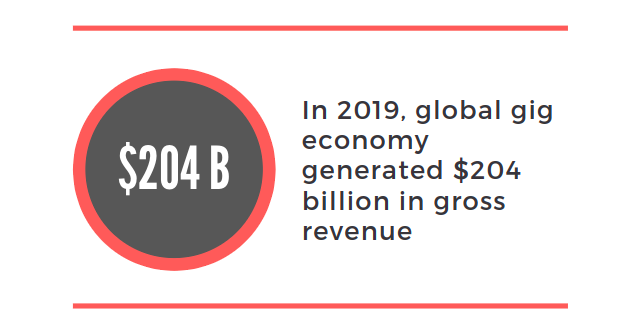Gig Economy: Transforming Looks and Outlooks

As humans have progressed through history, major developments have occurred in their perceptions and quality of life. We have always sought ways to make our lives easier while also focusing on the best outcome for our efforts. This was highly empowered by the technological advancements in the respective times. But above all, it is man’s eternal craving for comfort and happiness that has driven them to invent better ideas.
The term Gig came into being back in the 1900s. Although commonly associated with live musical performances, the term has found popularity across various industries and in the global economy. The rise of new industries led to the need for laborers on a temporary basis. This has garnered much acceptance since then. The transient nature of gigs exposes the individuals to fresher experiences. Entrepreneurs benefited from gig labor as they were rid of the various expenses associated with full-time labor. As new industries emerged, new jobs and responsibilities emerged with it giving opportunities for people who are more into part-time jobs and short-term work contracts. Soon, labor markets consisting of short-term contracts or freelance jobs emerged, also known as the “gig economy”.
In the modern world, the gig economy has taken the form of various job profiles such as freelancers, consulting, independent contractors and professionals, temps, moonlighters, and outsourced networks. Besides being a passion, gig work is highly popular among those who are thrilled with flexible working hours. The gig economy has the second-highest number of job opportunities. According to a Mastercard study conducted in 2019, the global gig economy generates $204 billion in gross revenue and is anticipated to rise by 17% by 2023. It has been projected that by 2027, the United States would have more gig workers than non-gig workers.

From Baby Boomers to Generation Z, each of these generational groups possess personality traits that would make them fit into the gig economy. The eagerness to educate the younger generation and the immense sense of contributing to the welfare of society make the baby boomers fit for gig work. Generation X is known for their impressive interpersonal skills and strong ability to work as a team. Their skills and resources make it easier for them to adapt to the gig work culture. The Millenials and their successor Generation Z have a lot in common. These groups of people are tech-savvy and prioritize their work-life balance. They are flexible and can easily adapt to the changes in the nature of work and its environment. Also, they don’t generally enjoy works of a repetitive nature.
Direct selling can be considered one of the earliest forms of gig work. Direct selling provided people with flexibility that established jobs did not provide decades ago. Besides art, entertainment, and construction industries, direct selling has attracted millions of people to its flexible work environment where distributors can effectively balance their work-life and be their own boss. In 2020, the direct selling channel generated $40.1 billion in retail sales in the United States, up 13.9 percent from the previous year. The number of persons selling products or services through the direct selling model increased by 13.2 percent, to 7.7 million part-time or full-time entrepreneurs in the United States. There are various factors that make direct selling appealing and worthwhile for the people who take part in it. Direct selling is known for the way it focuses on the leadership skills of its distributors. It means that someone must understand a brand and possess the intelligence and skill to sell to an audience. This makes it a good choice for ‘giggers’ who intend to expand their skills and resources and build a progressive career. Team Building is an integral part of direct selling. Direct selling nurtures distributors in developing their ability to work as a team. Also, direct selling doesn’t limit its salesforce in terms of age, gender, race, etc. That is one of the qualities which makes it an ideal gig work.

Millions of people actively participate in various direct selling organizations across the world. One of the main reasons that spark loyalty among distributors is their experience. Distributors must be exposed to a process that makes them engaged in every stage of the business. Software systems have played a major role in boosting the engagement of distributors. Personalization, gamification, automation, etc are some of the strategies in direct selling that make it more engaging. Modern direct selling also relies on data-driven insights to educate and train the distributors. This includes the understanding of trends and engagement of distributors and making the necessary changes in learning resources and strategies. This allows entrepreneurs to revamp their methods constantly so as to adapt to the changing trends and perspectives of the distributors.
A sense of purpose is very important as far as gig work is concerned. Direct selling organizations must also focus on building strong emotional connections with distributors from the time they are on board. With the industry expanding with newer products and services, direct selling can be a thrilling venture for the gig economy.